Small Internet Protocol Stack using a standard serial port.
PPP-Blinky - TCP/IP Networking Over a Serial Port
Note: The source code is at the bottom of this page.
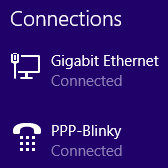
A Windows desktop showing PPP-Blinky in the network connections list.
Describe PPP-Blinky in Three Sentences
PPP-Blinky is a tiny library that enables Internet protocols (IPv4) to any mbed target hardware by using only a serial port.
The code runs on processors with as little as 8k RAM, for example the Nucleo-L053R8 board.
PPP-Blinky uses the industry-standard PPP (Point-to-Point) Protocol and a tiny "stateless" TCP/IP stack.
No Ethernet Port Required
No ethernet port is required - PPP-Blinky uses a serial port to send IP packets to your PC.
PPP-Blinky emulates a standard dial-up modem and therefore connects to Windows, Linux or Adroid machines.
The code runs on most ARM mbed platforms such as the LPC11U24 shown in the picture below:
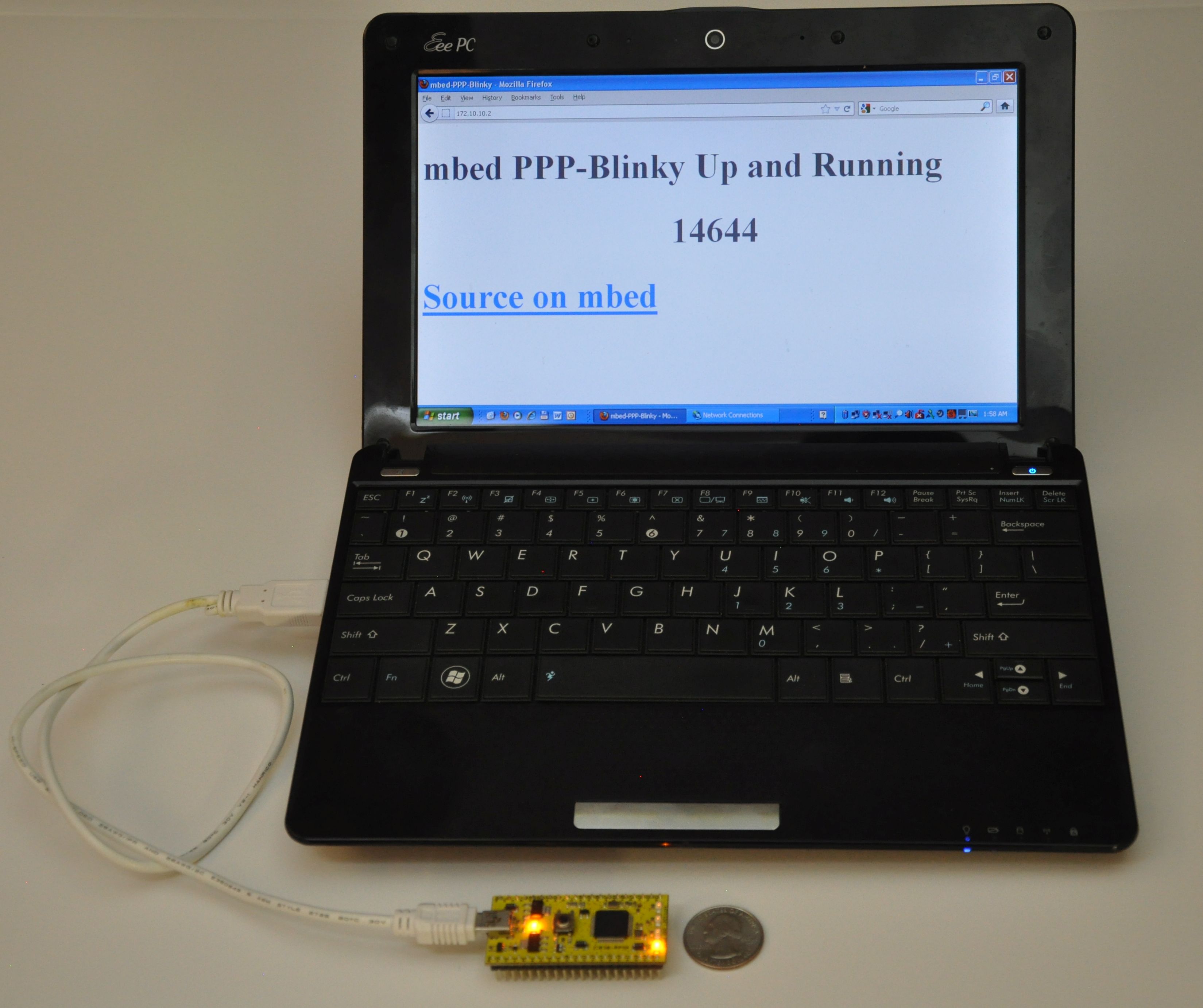 mbed LPC11u24 acting as a webserver to a Windows laptop.
mbed LPC11u24 acting as a webserver to a Windows laptop.
Webserver
The Webserver and WebSocket functions are ideal for building browser-based GUIs on mbed-enabled hardware.
PPP-Blinky's HTTP webserver works with most web clients such as Internet Explorer, Mozilla Firefox, Google Chrome, Safari, Curl, wget and Lynx as well as Microsoft Powershell Invoke-Webrequest command.
In the image below Firefox web browser displays the main web page embedded into PPP-Blinky's code:
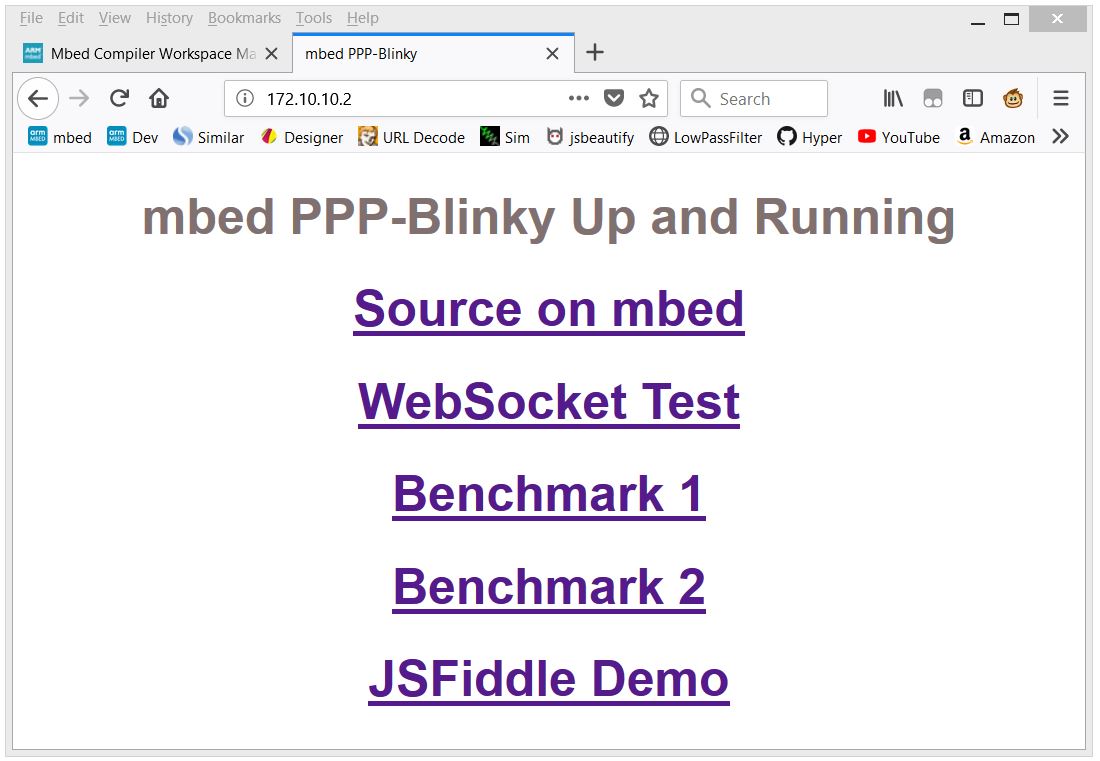 Firefox web browser displays a web page embedded into PPP-Blinky's code
Firefox web browser displays a web page embedded into PPP-Blinky's code
WebSocket Service
WebSocket is the most popular protocol standard for real-time bidirectional TCP/IP communication between clients and servers.
In the image below a small Internet Explorer script has connected to PPP-Blinky's WebSocket Service.
A websocket message was then sent by the browser and was echoed back by the WebSocket, triggering the onmessage event in the script.
The WebSocket service enables bidirectional real-time interaction between PPP-Blinky and any element in the browser DOM via JavaScript.
If you already have PPP-Blinky up and running you can test your WebSocket service using this: http://jsfiddle.net/d26cyuh2/112/embedded/result
Websockets are ideal for building browser-based GUIs for mbed hardware.
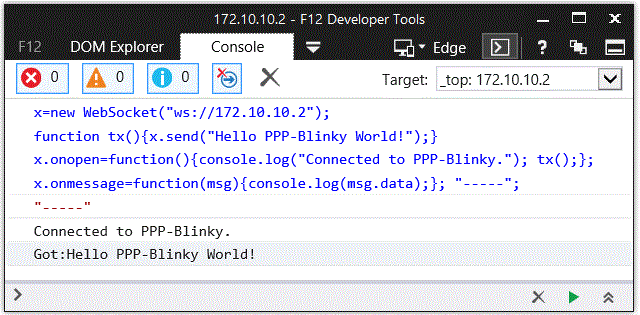
Trying PPP-Blinky on your mbed board
You will need an mbed-enabled hardware board: https://developer.mbed.org/platforms/
Establish a serial port connection between your host PC and your mbed board.
The easiest way is to use mbed hardware with a USB serial debug port. I've tried the ST-Micro Nucleo-L476RG, Nucleo-L152RE, Nucleo-F401RE, Nucleo-L432KC, Nucleo-L053R8, mbed-LPC11U24 and mbed-LPC1768 boards and they all work out of the box. Use the mbed online compiler to compile the software for your target board. Save the compiled binary to your hardware.
Before establishing a network connection, you can verify the operation of the code by opening a terminal program such as Tera Term, and setting the baud rate of the COM port on your mbed board to 115200 baud. LED1 should toggle for every two 0x7E (~) (i.e. tilde) characters you type, as 0x7E is the PPP frame start/end marker. Don't forget to close the port when your'e done testing, or else Windows Dial-up Networking will report that the COM port is in use by another program when you try to connect.
Once you are certain that the serial port and firmware is working, proceed to creating a new network connection on your PC -see below.
Creating a Dial-up Connection in Windows
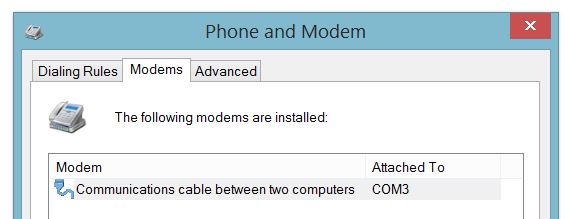
Setting up Dial-Up Networking (DUN) on your Windows 7 or 8 PC is essentially a two-step process: First, you create a new modem device, because PPP-blinky partially emulates a standard Windows serial port modem device. Second, you create a new Internet connection (in practice, a new network adapter) which is associated with your new "modem".
Step-by-step description of how to configure Windows for PPP-Blinky here:
/users/nixnax/code/PPP-Blinky/wiki/Configuring-Windows-Dial-Up-Networking
There is also a screen on how to set up Linux dial-up networking near the bottom of this page.
Connecting to PPP-Blinky from your PC
Once Windows networking is configured you can establish a dial-up connection to your mbed board over the USB virtual com port.
The IP address you manually assigned to the new dial-up network adapter (172.10.10.1) functions as a gateway to any valid IP address on that subnet. In the screen capture below, I'm sending pings from the Windows 8 command line to my ST-Micro Nucleo-L476RG board over the USB virtual serial Port. I'm also using a second serial port and Tera Term to capture the debug output from a second serial port on the hardware. The optional debug output from the board prints out the IP source and destination address and the first few bytes of the data payload. Note that the source is the adapter IP address, (172.10.10.1 in this case) and the destination is some other address on that subnet - all packets to the subnet are sent to our mbed hardware. For example, you could also ping 172.10.10.123 or, if your PPP-Blinky is running, simply click on this link: http://172.10.10.123
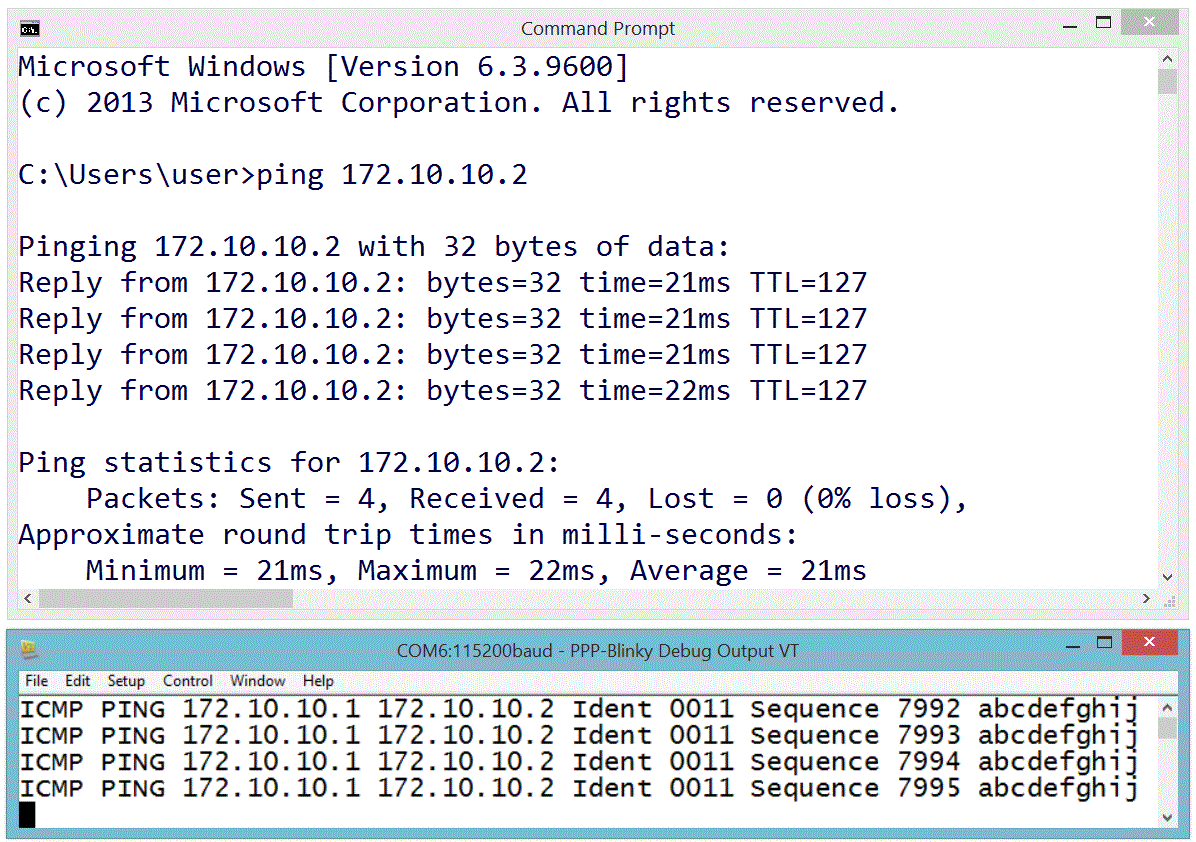
One Million Pings!
In the image below the ICMP ("ping") echo reply service was tested by sending one million pings to ppp-Blinky. This took over two hours.
The ping tool used on the Windows 8 PC was psping.exe from PsTools by Mark Russinovich - http://bit.ly/PingFast
The average reply time for a short ping (1 byte of payload data) was 11 milliseconds at 115200 baud on the $10 Nucleo-L053R8 board - barely enough time for 130 bytes to be sent over the port!
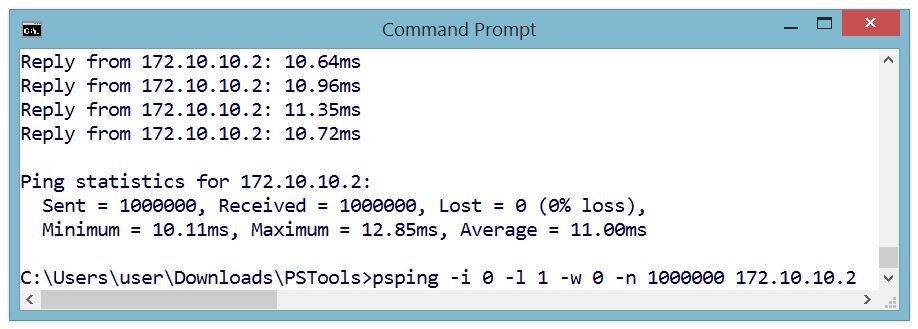
Monitoring PPP-Blinky Packets
The image below is from a Microsoft Network Monitor 3.4 capture session.
Responses from PPP-Blinky are shown in blue.
Frame 2 - Internet Explorer at IP 172.10.10.1 (the Dial-Up Adapter IP) requests a TCP connection by sending an S (SYN) flag.
Frame 3 - PPP-Blinky at IP 172.10.10.2 responds with an ACK in frame 3. One direction of the link is now established.
Frame 4 - The PC acknowledges the SYN sent by PPP-Blinky in frame 3. The TCP link is now fully established.
Frame 5 - The browser "pushes" (P flag is set) an HTTP GET request to PPP-Blinky.
Frame 6 - PPP-Blinky responds with a standard HTTP response "pushes" (P flag set) back a small web page. It also sets the A (ACK) flag to acknowledge the message sent in frame 6.
Frame 7 - The PC acknowledges reception of the HTTP payload.
Frame 8 - The PC starts to shut down the TCP connection by sending a FIN flag.
Frame 9 - PPP-Blinky acknowledges the FIN request - the connection is now closed in one direction. It also sets a FIN flag in the response to request closure of the opposite direction of the connection.
Frame 10 - The PC acknowledges the FIN request. The closing of the TCP connection is now confirmed in both directions.
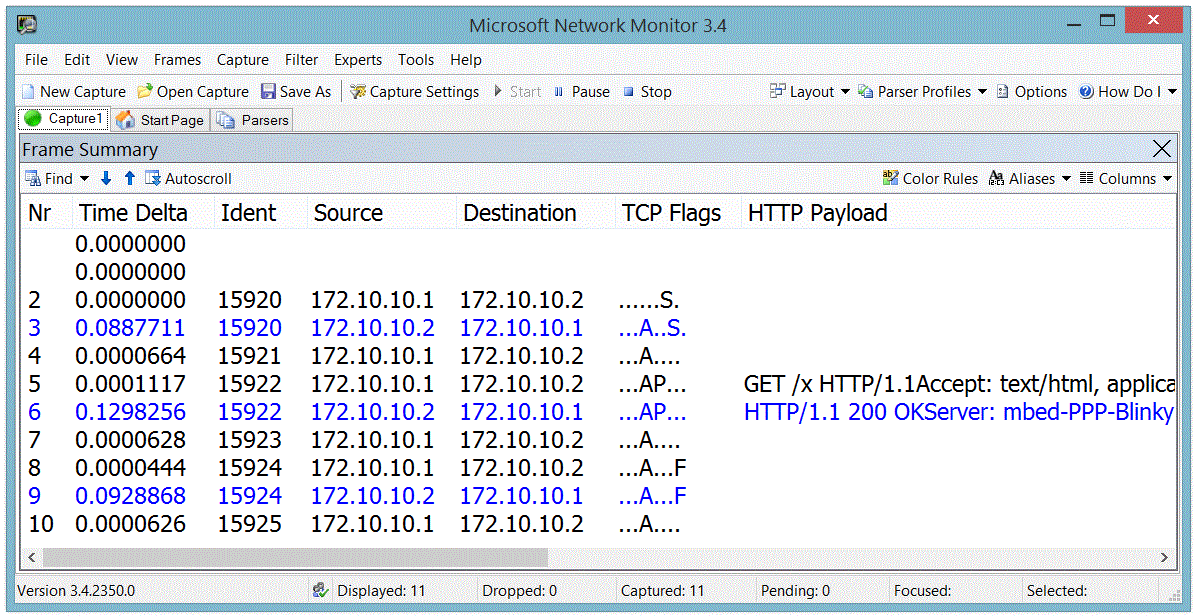
Debug Output
PPP-Blinky can output handy debug information to an optional second serial port.
The image below shows the debug output (Ident, Source, Destination, TCP Flags) for a complete HTTP conversation.
The PC messages are displayed in black. PPP-Blinky messages are blue.
Notice how PPP-blinky automatically inserts a blank line after each full HTTP conversation.
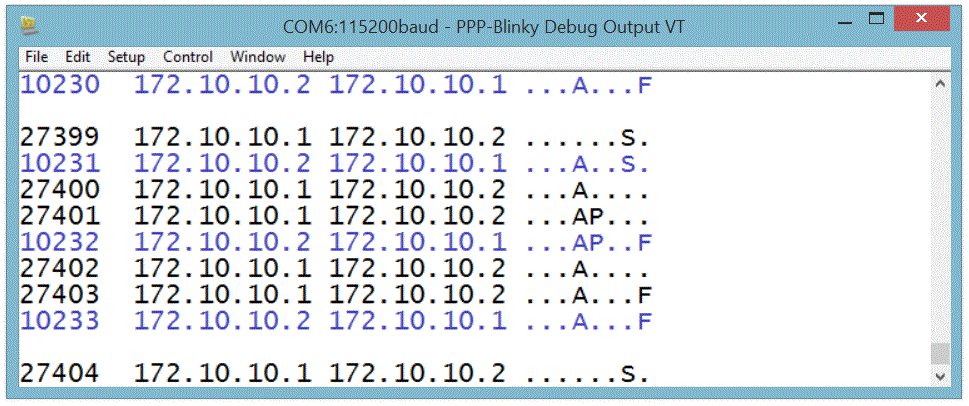
Creating a Dial-Up Connection in Linux
The screen below shows the required pppd command to connect to PPP-Blinky from a Linux machine. This was much simpler than Windows! The USB serial port of the mbed LPC1768 board registered as /dev/ttyACM0 on my Linux box. Do a websearch on pppd if you want to learn more about pppd, the Linux PPP handler. Near the bottom of the screen below, two webpages are fetched (/ and /y) by using the curl command on the command line. Gnome Webkit and Firefox work fine, too. Also try echo GET / HTTP/1.1 | nc 172.10.10.2 which uses netcat, the "Swiss army knife" of networking tools. PPP-Blinky was also tested with ApacheBench, the Apache server benchmark software. After 100000 fetches, the mean page fetch rate was reported as 6 page fetches per second for a small page.
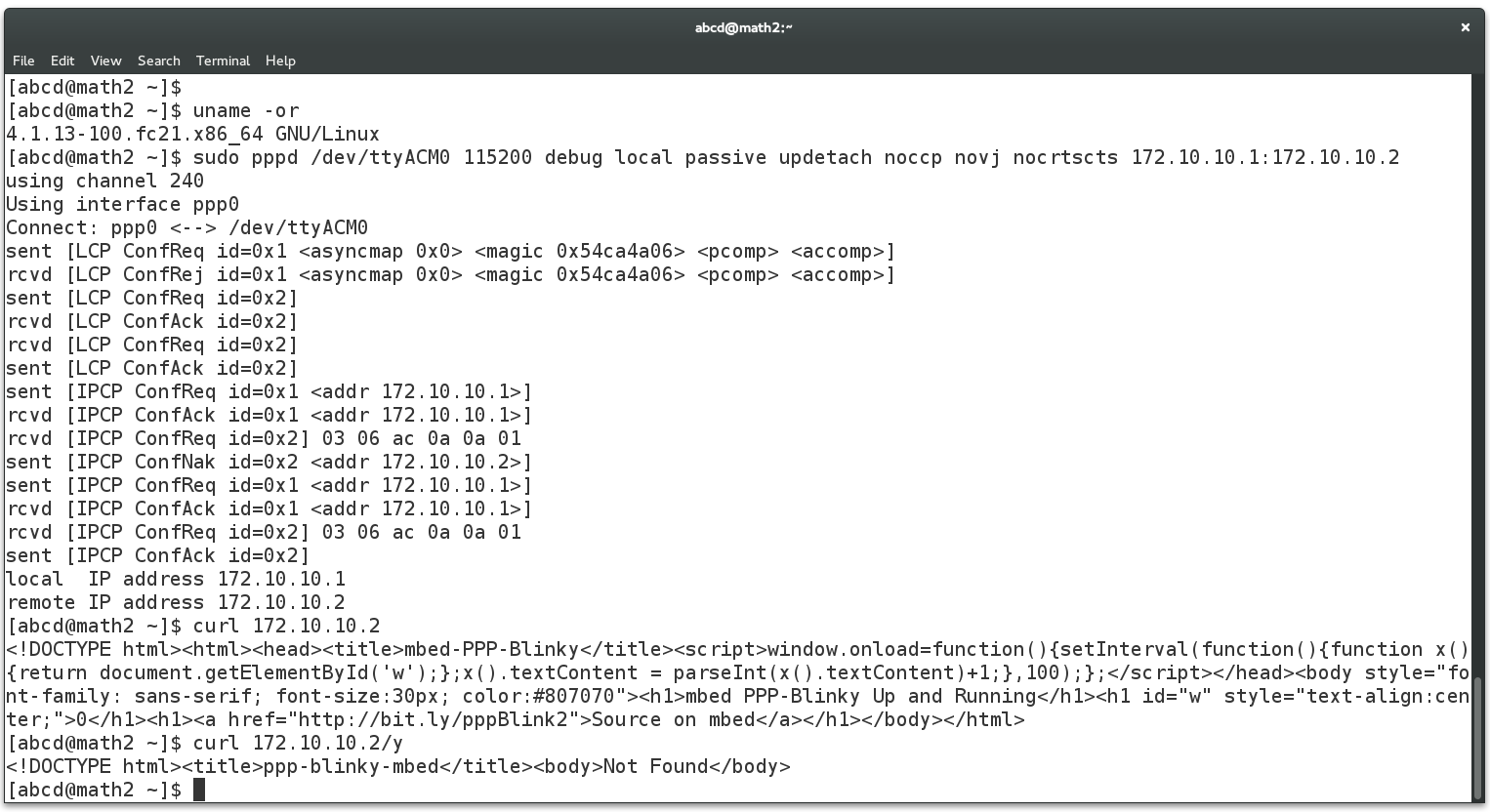
Caveats
PPP Blinky is an extremely sparse implementation (1.5k lines) of HTTP,WebSocket,TCP, UDP, ICMP, IPCP and LCP over PPP, requiring around 8kB of RAM. The minimum functionality required to establish connectivity is implemented. These are often acceptable tradeoffs for embedded projects as well as a handy tool to learn the practical details of everyday networking implementations.
Diff: main.cpp
- Revision:
- 119:e14dd2bf0ea3
- Parent:
- 118:54d1936e3768
- Child:
- 120:bef89e4c906e
--- a/main.cpp Tue Aug 08 01:58:22 2017 +0000
+++ b/main.cpp Tue Aug 08 17:10:29 2017 +0000
@@ -37,7 +37,7 @@
// The #define below enables/disables a second (OPTIONAL) serial port that prints out interesting diagnostic messages.
// Change to SERIAL_PORT_MONITOR_YES to enable diagnostics messages. You need to wire a second serial port to your mbed hardware to monitor this.
// Note - the LPC11U24 does NOT have a second serial port
-#define SERIAL_PORT_MONITOR_NO /* change to SERIAL_PORT_MONITOR_YES for debug messages */
+#define SERIAL_PORT_MONITOR_YES /* change to SERIAL_PORT_MONITOR_YES for debug messages */
// here we define the OPTIONAL, second debug serial port for the various target boards
// insert your target board's port here if it's not in yet - if it works, please send it to me - thanks!!!
@@ -53,16 +53,14 @@
#else
#error Add your target board's second serial port here if you want to use debugging - or choose SERIAL_PORT_MONITOR_NO
#endif
-#define debug(x...) xx.printf (x) /* if we have a serial port we print debug messages */
-#define debugputc(x...) xx.putc(x)
+#define debugPrintf(x...) xx.printf (x) /* if we have a serial port we print debug messages */
+#define debugPutc(x...) xx.putc(x)
#define debugBaudRate(x...) xx.baud(x)
-#define debugPuts(x...) xx.puts(x)
#else
-// if we don't have a debug port the debug functions do nothing
-#define debug(x...) {}
-#define debugputc(x...) {}
+// if we don't have a debug port the debug print functions do nothing
+#define debugPrintf(x...) {}
+#define debugPutc(x...) {}
#define debugBaudRate(x...) {}
-#define debugPuts(x...) {}
#endif
// verbosity flags used in debug printouts - change to 1 to see increasingly more detailed debug info.
@@ -110,6 +108,7 @@
int crc; // for calculating IP and TCP CRCs
int ledState; // state of LED1
int httpPageCount;
+ int firstFrame; // cleared after first frame
struct {
#define RXBUFLEN (1<<11)
// the serial port receive buffer and packet buffer, size is RXBUFLEN (currently 2048 bytes)
@@ -150,6 +149,7 @@
ppp.ledState=0;
ppp.hdlc.frameStartIndex=0;
ppp.httpPageCount=0;
+ ppp.firstFrame=1;
}
void led1Toggle()
@@ -165,7 +165,7 @@
if ( pc.readable() ) {
int hd = (ppp.rx.head+1)&(RXBUFLEN-1); // increment/wrap head index
if ( hd == ppp.rx.rtail ) {
- debug("\nReceive buffer full\n");
+ debugPrintf("\nReceive buffer full\n");
return;
}
ch = pc.getc(); // read new character
@@ -173,7 +173,7 @@
if ( ppp.online == 0 ) {
if (ch == 0x7E) {
ppp.online = 1;
- debug("HDLC Frame (0x7E)\n");
+ debugPrintf("HDLC Frame (0x7E)\n");
}
}
ppp.rx.head = hd; // update head pointer
@@ -182,14 +182,22 @@
}
// print to debug port while checking for incoming characters
+void putcWhileCheckingInput( char outByte )
+{
+#ifdef SERIAL_PORT_MONITOR_YES
+ fillbuf();
+ debugPutc( outByte );
+ fillbuf();
+#endif
+}
+
void printWhileCheckingInput( char * data )
{
#ifdef SERIAL_PORT_MONITOR_YES
char * nextChar = data;
while( *nextChar != 0 ) {
- debugputc( *nextChar ); // write one character to debug port
+ putcWhileCheckingInput( *nextChar ); // write one character to debug port while checking input
nextChar++;
- fillbuf(); // check the PC input stream
}
#endif
}
@@ -234,11 +242,11 @@
// In WireShark, use "Import Hex File". Options are: Offset=None, Protocol=PPP.
void dumpPPPFrame()
{
- for(int i=0; i<ppp.pkt.len; i++) debug("%02x ", ppp.pkt.buf[i]);
- debug(" CRC=%04x Len=%d\n", ppp.pkt.crc, ppp.pkt.len);
+ for(int i=0; i<ppp.pkt.len; i++) debugPrintf("%02x ", ppp.pkt.buf[i]);
+ debugPrintf(" CRC=%04x Len=%d\n", ppp.pkt.crc, ppp.pkt.len);
}
-void processHDLCFrame(int start, int end) // process received frame
+void processPPPFrame(int start, int end) // process received frame
{
led1Toggle(); // change led1 state on every frame we receive
if(start==end) {
@@ -275,7 +283,7 @@
} else {
if (1) {
char pbuf[50]; // local print buffer
- sprintf(pbuf, "\nPPP FCS(crc) Error CRC=%x Length = %d\n",ppp.pkt.crc,ppp.pkt.len); // print a debug line
+ sprintf(pbuf, "PPP FCS(crc) Error CRC=%x Length = %d\n",ppp.pkt.crc,ppp.pkt.len); // print a debug line
printWhileCheckingInput( pbuf );
if(0) dumpPPPFrame();
}
@@ -285,9 +293,12 @@
void hdlcPut(int ch) // do hdlc handling of special (flag) characters
{
if ( (ch<0x20) || (ch==0x7d) || (ch==0x7e) ) {
+ fillbuf();
pc.putc(0x7d);
+ fillbuf();
pc.putc(ch^0x20); // these characters need special handling
} else {
+ fillbuf();
pc.putc(ch);
}
}
@@ -306,11 +317,11 @@
void ipcpConfigRequestHandler()
{
- debug("Their IPCP Config Req, Our Ack\n");
+ debugPrintf("Their IPCP Config Req, Our Ack\n");
ppp.pkt.buf[4]=2; // change code to ack
send_pppFrame(); // acknowledge everything they ask for - assume it's IP addresses
- debug("Our IPCP Ask (no options)\n");
+ debugPrintf("Our IPCP Ask (no options)\n");
ppp.pkt.buf[4]=1; // change code to request
ppp.pkt.buf[7]=4; // no options in this request
ppp.pkt.len=10; // no options in this request shortest ipcp packet possible (4 ppp + 4 ipcp + 2 crc)
@@ -319,12 +330,12 @@
void ipcpAckHandler()
{
- debug("Their IPCP Grant\n");
+ debugPrintf("Their IPCP Grant\n");
}
void ipcpNackHandler()
{
- debug("Their IPCP Nack, Our ACK\n");
+ debugPrintf("Their IPCP Nack, Our ACK\n");
if (ppp.pkt.buf[8]==3) { // check if the NACK contains an IP address parameter
ppp.pkt.buf[4]=1; // assume the NACK contains our "suggested" IP address
send_pppFrame(); // let's request this IP address as ours
@@ -333,7 +344,7 @@
void ipcpDefaultHandler()
{
- debug("Their IPCP Other\n");
+ debugPrintf("Their IPCP Other\n");
}
void IPCPframe()
@@ -373,22 +384,22 @@
#endif
#define UDP_HEADER_SIZE 8
int udpLength = ((udpLen[0]<<8) | udpLen[1]) - UDP_HEADER_SIZE; // size of the actual udp data
- if(v0) debug("UDP %d.%d.%d.%d:%d ", srcIP[0],srcIP[1],srcIP[2],srcIP[3],srcPort);
- if(v0) debug("%d.%d.%d.%d:%d ", dstIP[0],dstIP[1],dstIP[2],dstIP[3],dstPort);
- if(v0) debug("Len %03d", udpLength);
+ if(v0) debugPrintf("UDP %d.%d.%d.%d:%d ", srcIP[0],srcIP[1],srcIP[2],srcIP[3],srcPort);
+ if(v0) debugPrintf("%d.%d.%d.%d:%d ", dstIP[0],dstIP[1],dstIP[2],dstIP[3],dstPort);
+ if(v0) debugPrintf("Len %03d", udpLength);
int printSize = udpLength;
if (printSize > 20) printSize = 20; // print only first 20 characters
if (v1) {
for (int i=0; i<printSize; i++) {
char ch = udpInf[i];
if (ch>31 && ch<127) {
- debug("%c", ch);
+ debugPrintf("%c", ch);
} else {
- debug("_");
+ debugPrintf("_");
}
}
}
- if (v0) debug("\n");
+ if (v0) debugPrintf("\n");
}
unsigned int dataCheckSum(unsigned char * ptr, int len)
@@ -453,8 +464,8 @@
int icmpIdent = (icmpType[4]<<8)|icmpType[5];
int icmpSequence = (icmpType[6]<<8)|icmpType[7];
#endif
- if(v0) debug("ICMP PING %d.%d.%d.%d %d.%d.%d.%d ", srcAdr[0],srcAdr[1],srcAdr[2],srcAdr[3],dstAdr[0],dstAdr[1],dstAdr[2],dstAdr[3]);
- if(v0) debug("Ident %04x Sequence %04d ",icmpIdent,icmpSequence);
+ if(v0) debugPrintf("ICMP PING %d.%d.%d.%d %d.%d.%d.%d ", srcAdr[0],srcAdr[1],srcAdr[2],srcAdr[3],dstAdr[0],dstAdr[1],dstAdr[2],dstAdr[3]);
+ if(v0) debugPrintf("Ident %04x Sequence %04d ",icmpIdent,icmpSequence);
char src[4];
char dst[4];
memcpy(src, srcAdr,4);
@@ -481,42 +492,31 @@
for (int i=0; i<printSize; i++) {
char ch = icmpData[i];
if (ch>31 && ch<127) {
- debug("%c",ch);
+ debugPrintf("%c",ch);
} else {
- debug("_");
+ debugPrintf("_");
}
}
- debug("\n");
+ debugPrintf("\n");
}
send_pppFrame(); // reply to the ping
} else {
if (v0) {
- debug("ICMP type=%d \n", icmpType[0]);
+ debugPrintf("ICMP type=%d \n", icmpType[0]);
}
}
}
void IGMPpacket() // internet group management protocol
{
- if (v0) debug("IGMP type=%d \n", ppp.pkt.buf[28]);
+ if (v0) debugPrintf("IGMP type=%d \n", ppp.pkt.buf[28]);
}
void dumpHeaderIP (int outGoing)
{
-
#if defined(IP_HEADER_DUMP_YES) && defined(SERIAL_PORT_MONITOR_YES)
- if(0) {
- if ( ppp.pkt.buf[37] != 0x10 ) return;
- if ( pc.readable() ) {
- printWhileCheckingInput("DH_IP\n"); // flag this condition in debug
- return;
- }
- if ((outGoing==1) && (ppp.pkt.buf[37]==0x11)) {
- //printWhileCheckingInput("A\n"); // flag this condigtion in debug
- return;
- }
- }
+ fillbuf(); // we are expecting the first character of the next packet
char * ipPkt = ppp.pkt.buf+4; // ip packet start
char * ident = ipPkt+4; // 2 bytes
#ifdef UNUSED_IP_VARIABLES
@@ -541,36 +541,30 @@
int protocolIP = protocol[0];
unsigned int checksumIP = (headercheck[0]<<8)|headercheck[1];
#endif
- int identIP = (ident[0]<<8)|ident[1];
+ int IPv4Id = (ident[0]<<8)|ident[1];
+ char pbuf[50]; // local print buffer
int n=0;
- char pbuf[140]; // local print buffer
-#ifdef DUMP_FULL_IP_ADDRESS
- n=n+sprintf(pbuf+n, "IP %d.%d.%d.%d %d.%d.%d.%d ",srcAdr[0],srcAdr[1],srcAdr[2],srcAdr[3], dstAdr[0],dstAdr[1],dstAdr[2],dstAdr[3]); // full ip addresses
-#else
- n=n+sprintf(pbuf+n, "%s ", outGoing ? "ME" : "IP" ); // write ME for outgoing and IP for incoming IP packets
- n=n+sprintf(pbuf+n, "%05d ",identIP); // ident is a good way to correlate our dumps with net monitor or wireshark traces
+ fillbuf(); // we are expecting the first character of the next packet
+ n=n+sprintf(pbuf+n, outGoing ? "\x1b[34m" : "\x1b[30m" ); // VT100 color code, print black for incoming, blue for outgoing headers
+ fillbuf(); // we are expecting the first character of the next packet
+ n=n+sprintf(pbuf+n, "%05d ",IPv4Id); // IPv4Id is a good way to correlate our dumps with net monitor or wireshark traces
+ fillbuf(); // we are expecting the first character of the next packet
+#define DUMP_FULL_IP_ADDRESS_YES
+#ifdef DUMP_FULL_IP_ADDRESS_YES
+ char * srcAdr = ipPkt+12; // 4 bytes
+ char * dstAdr = ipPkt+16; // 4 bytes = total of 20 bytes
+ n=n+sprintf(pbuf+n, " %d.%d.%d.%d %d.%d.%d.%d ",srcAdr[0],srcAdr[1],srcAdr[2],srcAdr[3], dstAdr[0],dstAdr[1],dstAdr[2],dstAdr[3]); // full ip addresses
#endif
printWhileCheckingInput( pbuf );
#ifndef TCP_HEADER_DUMP_YES
- debugputc('\n'); // there is no TCP header dump, so terminate the line with \n
+ printWhileCheckingInput('\x1b[30m\n'); // there is no TCP header dump, so terminate the line with \n and VT100 code for black
#endif
#endif
}
void dumpHeaderTCP(int outGoing)
{
-
#if defined(TCP_HEADER_DUMP_YES) && defined(SERIAL_PORT_MONITOR_YES)
- if (0) {
- if ( ppp.pkt.buf[37] != 0x10 ) return;
- if ( pc.readable() ) {
- printWhileCheckingInput("DH_TCP\n"); // flag this condition in debug
- return;
- }
- if ((outGoing==1) && (ppp.pkt.buf[37]==0x11)) {
- return;
- }
- }
int headerSizeIP = (ppp.pkt.buf[4]&0xf)*4; // header size of ip portion
char * tcpStart = ppp.pkt.buf+4+headerSizeIP; // start of tcp packet
char * seqtcp = tcpStart + 4; // 4 bytes
@@ -581,10 +575,11 @@
if (seq && ack) {} // shut up the compiler about unused variables
int flags = ((flagbitstcp[0]&1)<<8)|flagbitstcp[1];
- char flagInfo[9]; // text string presentating the 8 most important TCP flags
+ char flagInfo[9]; // text string presenting the 8 most important TCP flags
+#define PRINT_ALL_TCP_FLAGS_YES
+#ifdef PRINT_ALL_TCP_FLAGS_YES
memset(flagInfo,'.', 8); // fill string with "........"
flagInfo[8]=0; // null terminate string
-
if (flags & (1<<0)) flagInfo[7]='F';
if (flags & (1<<1)) flagInfo[6]='S';
if (flags & (1<<2)) flagInfo[5]='R';
@@ -593,27 +588,24 @@
if (flags & (1<<5)) flagInfo[2]='U';
if (flags & (1<<6)) flagInfo[1]='E';
if (flags & (1<<7)) flagInfo[0]='C';
-
- char sflagInfo[4];
- if (flags & (1<<1)) sflagInfo[0]='S';
- if (flags & (1<<4)) sflagInfo[0]='A';
- if (flags & (1<<3)) sflagInfo[0]='P';
- if (flags & (1<<0)) sflagInfo[0]='F';
- if (flags & (1<<2)) sflagInfo[0]='R';
- sflagInfo[1]=' ';
- sflagInfo[2]=0;
- sflagInfo[3]=0;
-
- //char pbuf[140]; // local print buffer
-#ifdef DUMP_IP_SEQUENCE_NUMBER
- //sprintf(pbuf, "%s Seq %10u\n", flagInfo, seq); // tcp flags and the sequence number
#else
- //sprintf(pbuf, "%s\n", flagInfo); // tcp flags only
+ if (flags & (1<<4)) flagInfo[0]='A'; // choose the most important flag to print
+ if (flags & (1<<1)) flagInfo[0]='S';
+ if (flags & (1<<0)) flagInfo[0]='F';
+ if (flags & (1<<3)) flagInfo[0]='P';
+ if (flags & (1<<2)) flagInfo[0]='R';
+ flagInfo[1]=' ';
+ flagInfo[2]=0;
#endif
- printWhileCheckingInput( sflagInfo );
- if( outGoing && ( ppp.pkt.buf[37] == 0x11 ) ) { // if this is an outgoing ACK/FIN with no data its probably the end of the TCP link
- debugputc('\n'); // so insert an extra line to mark the end of the conversation
+ printWhileCheckingInput( flagInfo );
+#define EVERY_PACKET_ON_A_NEW_LINE_YES
+#ifdef EVERY_PACKET_ON_A_NEW_LINE_YES
+ putcWhileCheckingInput('\n'); // write a newline after every packet
+#endif
+ if( outGoing && ( flags == 0x11 ) ) { // ACK/FIN - if this is an outgoing ACK/FIN its the end of a tcp conversation
+ putcWhileCheckingInput('\n'); // insert an extra new line to mark the end of an HTTP the conversation
}
+ if( pc.readable()) printWhileCheckingInput( "Char2\n");
#endif
}
@@ -628,7 +620,7 @@
httpGetRoot = strncmp(dataStart, "GET / HTTP/1.", 13); // found GET, respond to both HTTP/1.<anything>
xFetch = strncmp(dataStart, "GET /x", 6); // found GET /x , respond to both HTTP/1.<anything>
- // for example, in linux, xFetch can be used as: echo GET /x | nc 172.10.10.2
+ // for example, you could try this using netcat (nc): echo "GET /x" | nc 172.10.10.2
if( (httpGetRoot==0) || (xFetch==0) ) {
n=n+sprintf(n+dataStart,"HTTP/1.1 200 OK\r\nServer: mbed-PPP-Blinky\r\n"); // 200 OK header
} else {
@@ -655,7 +647,7 @@
#else
#define BENCHMARK_USING_BROWSER_NO /* set to _YES if you want to use your browser as a benchmark tool */
#ifndef BENCHMARK_USING_BROWSER_NO
- // a small script that reloads the page after 10 ms - handy for benchmarking using your web browser, use http://172.10.10.2/x
+ // semd a small browser script that will reload the page after 10 ms - handy for benchmarking with your web browser, use http://172.10.10.2/x
n=n+sprintf(n+dataStart, "<script>setTimeout(function(){location.reload();},10);</script><body>%d</body>",ppp.httpPageCount);
#else
n=n+sprintf(n+dataStart,"%d",ppp.httpPageCount); // not valid html but fast, most browsers and curl are ok with it
@@ -677,7 +669,7 @@
memcpy(dataStart+contentLengthStart, contentLengthString, CONTENTLENGTHSIZE); // copy Content-Length to it's place in the send buffer
if (v2) {
- debug("HTTP Response: HTTP-header %d HTTP-content %d HTTP-total %d\n",nHeader,n-nHeader,n);
+ debugPrintf("HTTP Response: HTTP-header %d HTTP-content %d HTTP-total %d\n",nHeader,n-nHeader,n);
}
return n; // total byte size of our response
}
@@ -690,7 +682,7 @@
n=n+sprintf(n+dataStart,"Got %04d bytes.\n",len); // report the number of bytes received
while( (n%4)!= 0) n=n+sprintf(n+dataStart,"*"); // insert spaces until n is exactly two away from a multiple of four
if (v2) {
- debug("TCP response %d byes\n",n);
+ debugPrintf("TCP response %d bytes\n",n);
}
return n; // total byte size of our response
}
@@ -698,7 +690,7 @@
void tcpHandler()
{
// IP header
- //fillbuf();
+
char * ipPkt = ppp.pkt.buf+4; // ip packet start
char * ihl = ipPkt; // bottom 4 bits
char * pktLen = ipPkt+2; // 2 bytes
@@ -756,15 +748,15 @@
int flagsOut = TCP_FLAG_ACK; // the default case is an ACK packet
int flagsTCP = ((flagbitstcp[0]&1)<<8)|flagbitstcp[1]; // the tcp flags we received
- windowsizetcp[0]=2; // tcp window size = 700
- windowsizetcp[1]=0xbc; // tcp windows size = 700
+ windowsizetcp[0] = (700 >> 8 ); // tcp window size hi byte
+ windowsizetcp[1] = (700 & 0xff); // tcp window size lo byte
// A sparse TCP flag interpreter that implements stateless TCP connections
switch ( flagsTCP ) {
case TCP_FLAG_SYN:
flagsOut = TCP_FLAG_SYN | TCP_FLAG_ACK; // something wants to connect - acknowledge it
- seq_out = seq_in+0x10000000U; // create a new sequence number using their sequence as a base
+ seq_out = seq_in+0x10000000U; // create a new sequence number using their sequence as a starting point, increase the highest digit
ack_out++; // for SYN flag we have to increase the sequence by 1
break;
case TCP_FLAG_ACK | TCP_FLAG_PSH:
@@ -846,10 +838,10 @@
memcpy( tcp-12, tempHold, 12); // restore the 12 bytes that the pseudo-header overwrote
dumpHeaderIP(1); // dump outgoing IP header
dumpHeaderTCP(1); // dump outgoing TCP header
- // for(int i=0; i<1; i++) {
- // wait_ms(1); // wait long enough to ensure we will be given time to dump the headers if we wanted to
- // fillbuf();
- //}
+ for (int i=0; i<35000/50; i++) { // a 35 ms delay before sending frame
+ fillbuf(); // catch any incoming characters
+ wait_us(50); // wait less than 1 character duration at 115200
+ }
send_pppFrame(); // All preparation complete - send the TCP response
}
@@ -860,11 +852,11 @@
int headerSizeTCP = ((ppp.pkt.buf[4+ipHeaderLen+12]>>4)&0xf)*4;; // length of tcp header
int dataLen = ipPktLen - ipHeaderLen - headerSizeTCP; // data is what's left after the two headers
if (v1) {
- debug("TCP %d ipHeader %d tcpHeader %d Data %d\n", ipPktLen, ipHeaderLen, headerSizeTCP, dataLen); // 1 for more verbose
+ debugPrintf("TCP %d ipHeader %d tcpHeader %d Data %d\n", ipPktLen, ipHeaderLen, headerSizeTCP, dataLen); // 1 for more verbose
}
if (dataLen > 0) {
ppp.pkt.buf[4+ipHeaderLen+headerSizeTCP+dataLen]=0; // insert a null after the data so debug printf stops printing after the data
- debug("%s\n",ppp.pkt.buf+4+ipHeaderLen+headerSizeTCP); // show the data
+ debugPrintf("%s\n",ppp.pkt.buf+4+ipHeaderLen+headerSizeTCP); // show the data
}
}
@@ -880,7 +872,7 @@
void otherProtocol()
{
- debug("Other IP protocol");
+ debugPrintf("Other IP protocol");
}
void IPframe()
@@ -906,16 +898,16 @@
void LCPconfReq()
{
- debug("LCP Config ");
+ debugPrintf("LCP Config ");
if (ppp.pkt.buf[7] != 4) {
ppp.pkt.buf[4]=4; // allow only "no options" which means Maximum Receive Unit (MRU) is default 1500 bytes
- debug("Reject\n");
+ debugPrintf("Reject\n");
send_pppFrame();
} else {
ppp.pkt.buf[4]=2; // ack zero conf
- debug("Ack\n");
+ debugPrintf("Ack\n");
send_pppFrame();
- debug("LCP Ask\n");
+ debugPrintf("LCP Ask\n");
ppp.pkt.buf[4]=1; // request no options
send_pppFrame();
}
@@ -923,7 +915,7 @@
void LCPconfAck()
{
- debug("LCP Ack\n");
+ debugPrintf("LCP Ack\n");
}
void LCPend()
@@ -932,12 +924,12 @@
send_pppFrame(); // acknowledge
ppp.online=0; // start hunting for connect string again
pppInitStruct(); // flush the receive buffer
- debug("LCP End\n");
+ debugPrintf("LCP End\n");
}
void LCPother()
{
- debug("LCP Other\n");
+ debugPrintf("LCP Other\n");
dumpPPPFrame();
}
@@ -962,22 +954,22 @@
void discardedFrame()
{
if (v0) {
- debug("Frame is not IP, IPCP or LCP: %02x %02x %02x %02x\n", ppp.pkt.buf[0],ppp.pkt.buf[1],ppp.pkt.buf[2],ppp.pkt.buf[3]);
+ debugPrintf("Frame is not IP, IPCP or LCP: %02x %02x %02x %02x\n", ppp.pkt.buf[0],ppp.pkt.buf[1],ppp.pkt.buf[2],ppp.pkt.buf[3]);
}
}
void determinePacketType()
{
if ( ppp.pkt.buf[0] != 0xff ) {
- debug("byte0 != ff\n");
+ debugPrintf("byte0 != ff\n");
return;
}
if ( ppp.pkt.buf[1] != 3 ) {
- debug("byte1 != 3\n");
+ debugPrintf("byte1 != 3\n");
return;
}
if ( ppp.pkt.buf[3] != 0x21 ) {
- debug("byte2 != 21\n");
+ debugPrintf("byte2 != 21\n");
return;
}
int packetType = ppp.pkt.buf[2];
@@ -996,7 +988,7 @@
}
}
-void wait_for_HDLC_frame()
+void wait_for_PPP_frame()
{
while(1) {
fillbuf(); // handle received characters
@@ -1004,13 +996,17 @@
int oldTail = ppp.rx.tail; // remember where the character is located in the buffer
int rx = pc_getBuf(); // get the character
if (rx==FRAME_7E) {
- ppp.hdlc.frameEndIndex=oldTail; // mark the frame end character
-
- processHDLCFrame(ppp.hdlc.frameStartIndex, ppp.hdlc.frameEndIndex); // process the frame
-
- ppp.rx.rtail = ppp.rx.tail;
- ppp.hdlc.frameStartIndex = ppp.rx.tail; // where next frame will start
- break;
+ if (ppp.firstFrame) { // is this the first frame start
+ ppp.firstFrame=0;
+ ppp.hdlc.frameStartIndex = ppp.rx.tail; // remember first frame start
+ break;
+ } else {
+ ppp.hdlc.frameEndIndex=oldTail; // mark the frame end character
+ processPPPFrame(ppp.hdlc.frameStartIndex, ppp.hdlc.frameEndIndex); // process the frame
+ ppp.rx.rtail = ppp.rx.tail;
+ ppp.hdlc.frameStartIndex = ppp.rx.tail; // where next frame will start
+ break;
+ }
}
}
}
@@ -1024,47 +1020,24 @@
char * found1 = strstr( (char *)ppp.rx.buf, "CLIENT" );
if (found1 != NULL) {
// respond with Windows Dialup networking expected "Direct Connection Between Two Computers" response string
- if (v0) debug("Found connect string \"CLIENT\", sent \"CLIENTSERVER\"\n");
+ if (v0) debugPrintf("Found connect string \"CLIENT\", sent \"CLIENTSERVER\"\n");
pc.puts("CLIENTSERVER");
ppp.online=1; // we are connected, so we can stop looking for the connect string
+ fillbuf();
}
}
}
-
-
-
-
-
-
-
-
-
-
-
-
-
-
-
-
-
-
-
-
-
-
-
-
int main()
{
pc.baud(115200); // USB virtual serial port
debugBaudRate(115200); // baud rate for our debug port if we have one
- debugPuts("\x1b[2J\x1b[HReady\n"); // VT100 code for clear screen & home on our debug port
+ debugPrintf("\x1b[2J\x1b[HReady\n"); // VT100 code for clear screen & home on our debug port - Tera Term is a good VT100 terminal
pppInitStruct(); // initialize all the PPP properties
while(1) {
- scanForConnectString(); // respond to connect command from windows dial up networking
+ scanForConnectString(); // wait for connect command from windows dial up networking
while(ppp.online) {
- wait_for_HDLC_frame();
+ wait_for_PPP_frame();
}
}
}
\ No newline at end of file
 Nicolas Nackel
Nicolas Nackel